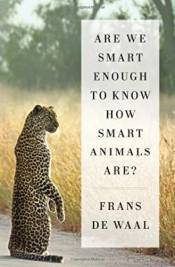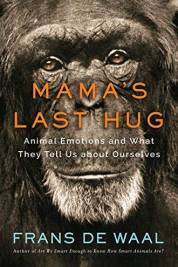
Are We Smart Enough To Know How Smart Animals Are?
Pages: 352
Edition: Hardcover
List Price: $27.95
Publisher: Norton
ISBN: 9780393246186
First entered: 30
Number of weeks: 3
Book Summary
From world-renowned biologist and primatologist Frans de Waal, a groundbreaking work on animal intelligence destined to become a classic.What separates your mind from an animal’s? Maybe you think it’s your ability to design tools, your sense of self, or your grasp of past and future―all traits that have helped us define ourselves as the planet’s preeminent species. But in recent decades, these claims have eroded, or even been disproven outright, by a revolution in the study of animal cognition. Take the way octopuses use coconut shells as tools; elephants that classify humans by age, gender, and language; or Ayumu, the young male chimpanzee at Kyoto University whose flash memory puts that of humans to shame. Based on research involving crows, dolphins, parrots, sheep, wasps, bats, whales, and of course chimpanzees and bonobos, Frans de Waal explores both the scope and the depth of animal intelligence. He offers a firsthand account of how science has stood traditional behaviorism on its head by revealing how smart animals really are, and how we’ve underestimated their abilities for too long.People often assume a cognitive ladder, from lower to higher forms, with our own intelligence at the top. But what if it is more like a bush, with cognition taking different forms that are often incomparable to ours? Would you presume yourself dumber than a squirrel because you’re less adept at recalling the locations of hundreds of buried acorns? Or would you judge your perception of your surroundings as more sophisticated than that of a echolocating bat? De Waal reviews the rise and fall of the mechanistic view of animals and opens our minds to the idea that animal minds are far more intricate and complex than we have assumed. De Waal’s landmark work will convince you to rethink everything you thought you knew about animal―and human―intelligence. 32 illlustrations
Authors

Name: Frans de Waal
Hometown: 's-Hertogenbosch
Born: Oct, 1948
About the author:
"Frans B.M. de Waal, PhD (born 29 October 1948, 's-Hertogenbosch), is a Dutch psychologist, primatologist and ethologist. He is the Charles Howard Candler professor of Primate Behavior in the Emory University psychology department in Atlanta, Georgia, and director of the Living Links Center at the Yerkes National Primate Research Center and author of numerous books including Chimpanzee Politics and Our Inner Ape. His research centers on primate social behavior, including conflict resolution, cooperation, inequity aversion, and food-sharing. In 1993, he was elected to the Royal Netherlands Academy of Arts and Sciences, to the United States National Academy of Sciences in 2004, and the American Academy of Arts and Sciences, in 2008.
In 1977, de Waal received his doctorate in biology from Utrecht University after training as a zoologist and ethologist. His dissertation research concerned aggressive behavior and alliance formation in macaques.
In 1975, de Waal began a six-year project on the world's largest captive colony of chimpanzees at the Arnhem Zoo. The study resulted in many scientific papers, and resulted in publication of his first book, Chimpanzee Politics, in 1982.
In 1981, he moved to the United States for a position at the Wisconsin National Primate Research Center, and took his current position at Emory and the Yerkes National Primate Research Center in 1991.
His research into the innate capacity for empathy among primates has led de Waal to the conclusion that non-human great apes and humans are simply different types of apes, and that there is little difference between these species.
His book, Our Inner Ape, examines human behavior through the eyes of a primatologist, using the behavior of common chimpanzees and bonobos as metaphors for human psychology.
De Waal was named one of Time magazine's most influential 100 people in 2007.
De Waal also works in the field of social psychology. De Waal is currently on the Editorial Board of Greater Good Magazine, published by the Greater Good Science Center of the University of California, Berkeley. His contributions include the interpretation of scientific research into the roots of compassion, altruism, and peaceful human relationships. Besides being a contributor, de Waal, also has an article on Empathy in Greater Good magazine. He further writes a column for Psychologie, a popular Dutch monthly magazine."
-http://en.wikipedia.org/wiki/Frans_de...
